#is the main trio of GoF meeting for the first time
Note
Happy Tuesday!!
What is your absolute favorite scene to write?
Hi! Thanks for the question💜
I want to say dialogue-heavy scenes, with characters sitting around a table, and with banter and discussion how the plot will progress, but that's not quite it.
It's when I have 3-4 characters, who have come together from different situations. For example: One has a headache and is unusually snappy. One has learnt some impactful news earlier that day and is struggling to focus, but doesn't want to share the news either. Another one for whatever reason has a thing on their mind and slightly derails the conversation when they're reminded of it. Another one is a nerd and oh look they accidentally gave a paragraph of exposition about the world, before the others shushed them.
Yes, it's 'just' dialogue. But I love testing just how much stuff I can pack alongside it. And I love the feeling of writing characters that act differently because of the most recent developments, but it's still consistent with their characterisation. When you know exactly where the deviation from the norm comes from.
#thank you for asking!#ask and i shall answer#and a very concrete example of this kind of scene#is the main trio of GoF meeting for the first time#Lissan is scared and desperate for help because he's just acquired a demon#Ianim feels guilty about it for reasons but also embarrassed to be asking his high ranking ex for help#and Gullin sees his ex through circumstances coddling another guy#and definitely isn't catty and snappy towards Lissan because of it
2 notes
·
View notes
Text
Harry And Personal Conflict: A Meta On Evolving Dynamic With Ron and Hermione
One of my last metas on Harry was how his abuse at the Dursleys informed who he is as a person and a lot of his main personality traits. This time, I want to explore Harry's relationship with conflict, mostly in regard to his best friends - Ron and Hermione.
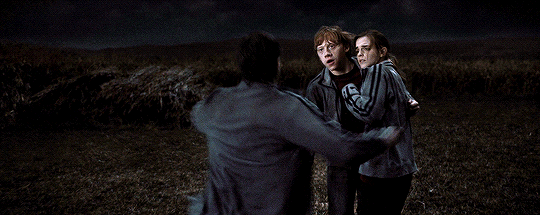
First things first, because of his abusive upbringing where he is constantly in conflict with his caregivers, conflict is seen as Bad Thing when we first meet him as a 11 year old. And it informs how he reacts to both Ron and Hermione at first. He instantly relates to Ron because Ron is an underdog - a boy who feels neglected and passed over in his large and boisterous family. Harry shares his own experience of neglect with Ron and they both bond instantly.
His initial impression of Hermione is that she has a "bossy sort of voice" . The bossiness is an important characterstic to his impression of her - she reminds him of an authority figure and he does not particularly take to her as easily as he does Ron. Before the troll incident, he is frequently annoyed by her interventions because "he can't believe anyone would be so interfering". It's her vulnerability and the fact that she may be in danger that makes Harry, and by extension Ron, go after her. And she pays it back in full with a demonstration of loyalty to them in front of people she wants to impress: teachers. This sets the tone of his friendship with Ron and Hermione.
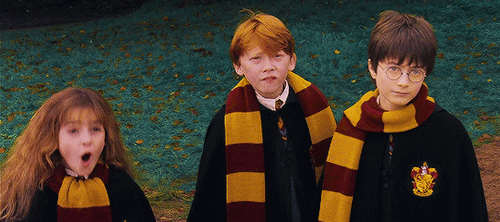
There is sense of easiness to his friendship with Ron, especially in earlier books that he doesn't quite share with Hermione. This is a bit gendered as well, of course. His relationship with Hermione evolves as Ron's own equation with two of them changes, more specifically Ron's cognisance of his romantic feelings for Hermione. So how does this inform his relationship with personal conflict?
Let's look at it Book wise.
Book 1-4: Since Harry tends to see All Conflict As Bad, when Hermione becomes his friend, he tends to ignore traits of her that he particularly doesn't take to. Specifically her argumentativeness - which he usually leaves Ron to deal with. For example, look at when Hermione drags him off to the kitchens in GOF. When he realises what this is about, he nudges Ron, and Ron does the protesting: "Hermione, you are trying to rope us into that spew stuff again!".
Often, you can say he is amused by Ron's more ..let's say colourful.. reactions to Hermione being overbearing. So when Ron and him are not speaking and Hermione gets a Quidditch term wrong, it causes him "a pang to imagine Ron's expression of he could have heard Hermione talking about Wonky Faints". It's that deeply ingrained into the dynamic.
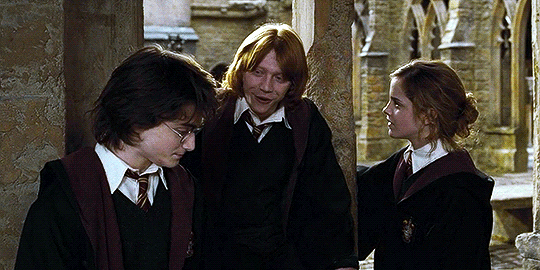
While Ron acts buffer and protects Harry from stepping into a potential conflict ("skip the lecture", "don't nag" he tells her), Harry's world view remains quite the same. Part of Harry's growing up is integrating conflicting points of view and gaining nuance. For example, he can't understand why someone like Snape, who seems to hate him so much, can also save his life at the end of Philosopher's Stone. This is his first venture into trying to integrate two conflicting things about a person into nuance. Dumbledore gives him a very easily digestible story, one that appeals to his ideal of his father and Harry is sated.
Again, Harry's world view is tested when he finds out that he relates with Tom Riddle - for their "strange likenesses". He doth protest too much at Dumbledore's office: "I don't think I am like him! I am Gryffindor!". And Dumbledore offers him a wisdom nugget: "It's our choices which define who we are" (paraphrasing). Harry is uncomfortable that he empathises with Tom Riddle, his parents' murderer, at this point in the story.
In the first four books, his only proper personal conflict has been with Ron.
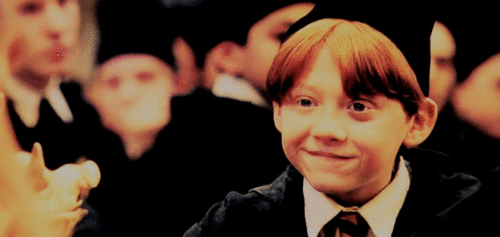
It is depressing to think about in these terms - but Ron is Harry's first experience of unconditional love (we can even put Hagrid here, but he is not the one who spends most time with Harry). And when Ron and him fight, Harry is so hurt by the prospect that he proceeds to abandon Ron before Ron abandons him. (the whole chucking a "Potter stinks" badge at him and making a jab about having a scar is what he wants, or the fight in DH where he yells "then leave! Pretend you have gotten over your spattergoit and have your mummy feed you up"). It's an interesting defense mechanism and he feels "corrosive hatred" towards Ron during these times because Ron and him aren't supposed to be like this. Ron is a certainty in his life. It's also why when Ron comes back, Harry either doesn't need him to apologise (as in GOF) or quickly forgives him in DH - although I do think Harry thinks the locket bit was punishment enough. But even without the whole locket, I think Harry has trouble holding Ron accountable in general beyond few slaps on the wrist - especially if Ron and he are on good terms.
5th Book: This is the transition point for Golden Trio friendship. Harry has come back from an immensely traumatising night at the graveyard and his PTSD isolates him from his best friends. This is also the point where Ron, especially after GOF, is aware of his romantic feelings for Hermione ("the perfume is unusual Ron", Hermione tells him in this book). So in this book, we often see Ron and Hermione on one side, with Harry on the other.
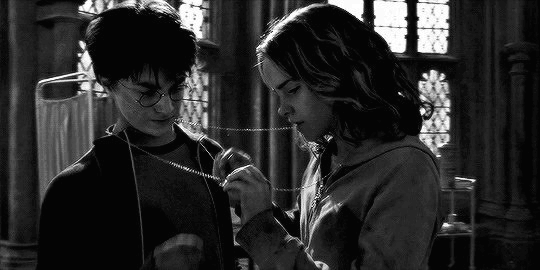
Ron is unwilling (quite like Harry in that respect) to engage him in a direct conflict, but he is also unwilling to shield him from Hermione's nagging in this book. This is why, OOTP is the book where you see Harry ignore or avoid Hermione and lie to her more than usual to avoid conflict. For example, he tells her that Snape thinks he can carry on Occlumency once he got the basics - that is categorically not what happened. Or the entire day he spends ignoring Hermione's warnings about breaking into Umbridge's office. (The description here is comical - about Hermione vehemently hissing so much that Seamus Finnigan is checking his cauldron for leaks. ) If he cannot lie to her or avoid her, at the end of the rope, he will treat her to display of his frightening temper.
Interestingly, OOTP is also the book that his world view goes through a tremendous upheaval: mainly, his ideal of his father and having empathy for Snape. It is unnerving for Harry to see Snape being the "boy who cried in the corner" when his father shouts at a cowering woman. Similarly unnerving is that his intense empathy for him - "he knew exactly what Snape felt when his father taunted him and judging by what he had seen, his father was every bit as arrogant as Snape always told him".
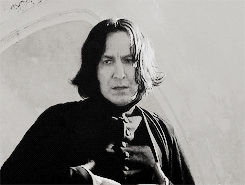
While he is placated that his father grew out of it, this memory of his father being a bully is something he cannot bear to watch again in DH. Few chapters later, he grins at Ron "sweeping his hair" back to make it look more windswept, just like his father - suggesting that Harry is beginning to integrate two conflicting things he knew about his father: from the people who loved him vs the people he was cruel to.
6th Book onwards: It's interesting to me that his better appreciation for Hermione comes after OOTP (one, because she is the one who challenged the whole Ministry plan and she followed him into a trap knowing it was one anyway) but also the timing of it is in line with Harry having a more nuanced understanding of his father. He struggled to hold conflicting information about him into one cohesive person - the boy who was a bully vs the man who joins Order of Phoenix to fight a war he could very well have sat out. The pedestal crashing helped Harry gain nuance (he thinks of his father and mother with pride in HBP - of them walking into an arena with head held high). HBP also sets up his deeper understanding with Snape in DH. There is lovely meta by about this by thedreamersmusing. Read it here. HBP is also the book he feels "sorry" for Voldemort and also feels "reluctant admiration" for him - both of things he is less defensive about.
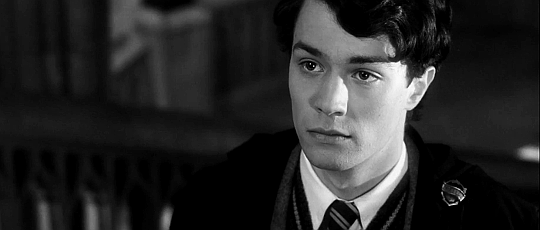
And this nuance informs his relationship with conflicts - especially the kind he has with Hermione. He is more confrontational with her and does not lie or sneak around her as much as he did in OOTP in the Half Blood Prince. ("Finished? Or do you want to see if it does back flips?" He asks her when she takes the book from him to check if it's jinxed. Or the "I hope you enjoy yourself" he calls out irritably when she declares intention to find out who HBP is. And "do you want to rub it in Hermione? How do you think I feel now?" He tells her when she says she was right about HBP).
The fact that he is willing to be confrontational with her is a big step in his character - a step up from his unregulated outbursts in OOTP, which is a function of him not knowing how to put his anger across in normal ways. He is also more willing to stand up for her in front of Ron too - "You could say sorry" he tells Ron bluntly. This is in contrast to his more quiet standing up for her in POA: "Can't you give her a break?" Harry asked him quietly. In POA, he lets the subject drop after Ron flatly refuses. Here, he presses on more : "What did you have to imitate her for?" "She laughed at moustache!" "So did I, it's the stupidest thing I have ever seen".
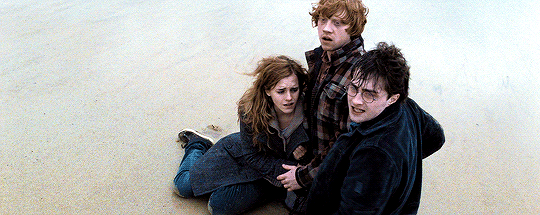
His relationship with Ron is an interesting contrast to his relationship with Hermione, which functionally teaches a very important lesson for an abused child who thought all conflicts are bad: That his friendship with her is challenging, and frustrating, filled with conflicts but their love for each other isn't disputed. It's a very important thing for brain development in general - to hold conflicting information in one space. The defense mechanism abused children do to avoid this is called splitting.
So, Ron allows Harry to be the age he is: a teenager and it's foundation for his further development, and Hermione teaches him how to be an adult, and therefore, spurs his growth. (In esoteric terms, if you look at Ron and Hermione as proxy parents - Ron is the Mother archetype, the one who offers unconditional love. Hermione is the Father archetype - one who demands best of him, and guides him).
Additional reading: Harry, Prongs and Prince - Harry's Inner Struggles For Forging An Identity. By u/metametatron4
Harry Identifies, and Reluctantly Admires Snape Even Before The Prince's Tale by thedreamersmusing
#harry james potter#hp meta#harry potter character analysis#hp character analysis#golden trio#golden trio analysis#harry x ron x hermione#harry and ron#harry and hermione#ron x Hermione#severus snape#james Potter#harry potter#tom riddle#albus percival wulfric brian dumbledore#albus dumbledore#metas#harry potter and order of phoenix#harry Potter and half blood Prince
635 notes
·
View notes
Note
Is there anything you don’t like about Ron? Like I find my number one favourite characters ever annoying sometimes lol xx
That’s a very goodquestion! Yes, there are a few things that I don’t like about Ron. Obviously,the character isn’t perfect, and I wouldn’t want him to be.
1- Ron’s lack ofself-belief
This is one ofthe things that maddens me everytime I read the HP series. From the very firsttime we meet him, Ron’s inability to believe in his own abilities stands outlike a sore thumb. In his very first meeting with Harry, Ron says that he’s“got a lot to live up”. All of his older brothers have some distinguishingcharacteristic that makes them stand out from the crowd. Bill was head-boy andwent on to be a curse-breaker, Charlie was brilliant at Quidditch and workswith dragons, Percy was very intelligent and a prefect, whilst Fred and Georgewere really funny and still got high marks.
By contrast, Rondoesn’t have a lot of room to make his own name. He even points out that ‘Everyone expects me to do as well as theothers, but if I do, it’s no big deal, because they did it first’. Andthus, Ron’s lack of confidence in his own abilities is laid out; what’s thepoint in trying if you’ll never stand out even when you do succeed?
Throughout theseries, Ron never performs especially well academic-wise. Of course, this couldbe simply down to the fact that he was the only one of his siblings who had tostart Hogwarts with a second-hand wand (even Ginny got her own, whilst Ron hadto use his now-broken hand-me-down for the whole of his second year), but Ithink it has something to do with his own lack of self-belief.
Out of the trio,he gets the lowest marks of his OWLs (although still getting better marks thanFred and George, I might add), and has a habit of being largely ignored byteachers unless he’s doing something wrong (heck, Slughorn ignores Ronthroughout most of sixth year because he doesn’t seem him as ‘special’ likeHarry and Hermione).
Ron’sinsecurities are the main driving force behind his character arc, but it stillpains me to see Ron never believing in himself or his own abilities.
And the worsething is- Ron is actually RIDICULOUSLY good at magic.
He is somehowable to cast non-verbal spells (somethingsixth-year students struggle with) at the age of twelve, through a brokensecond-hand wand that didn’t even choose him as its owner.
He also breaksGamp’s Law of Elemental Transfiguration while he does it (creating slugs-technically a form of food- out of nothing).
Not only that,but he also has a bizarre talent for predicting future events;
He correctly predictedthat Tom Riddle had murdered Myrtle
That Harry wouldbe happy about feeling sad in third year
That Harry wouldbe stabbed in the back by someone he thought a friend (the fake Moody)
Andhe’s really good at emotional magic;
Was the first ofthe trio to realise that the Horcrux locket was sort-of alive
Correctly guessedthat Voldemort’s name had the taboo on it
Was able to workout how the Deluminator worked, and used it to get back to Harry and Hermione
Ronwas brilliant as a wizard, but, thanks to his own lack of self-belief andconstantly getting ignored in favour of those around him, his talents werenever really recognised.
2- Ron’s apparent immaturity
Up until GOF,Ron was the most emotionally-mature member of the golden trio. He was able tokeep a cool head in tense situations, and was able to read his friends’emotions far better than anyone ever gave him credit for.
However, in GOF,Ron’s emotional maturity (as well as his intelligence) takes a suddennose-dive. Now, I’m not saying that this was caused by JK Rowling’s meetingswith Steve Kloves when developing the film series in between POA and GOF, but it’sa possibility that Kloves’ love (read ‘idealisation’) of Hermione rubbed off onRowling, and she decided to write Ron as emotionally-insensitive (especiallywhen it came to girls) and more immature than his two friends.
The differencebetween the Ron of the first three books, and the Ron of the later four booksis quite a large one. Pre-GOF Ron was occasionally insensitive but prettybang-on when it came to people’s emotions. Post-GOF Ron had a dramatic cut tohis maturity and overall intelligence. It’s as if JK Rowling assumed that boysundergoing puberty must have their emotional maturity and intelligencedrastically reduced just because of their hormones.
And, while thatmay be true to a certain extent, it’s the fact that even Ron’s mature momentsin the later books is still framed as‘immature’ that annoys me. Even when Ron is actually acting maturely for hisage (like not talking to Hermione after she attacks him with a flock ofravenous birds- a pretty sensible response to it, I would say), Rowling framesit as immature so as to make Hermione seem more sympathetic. It drives me upthe wall.
3- What happenedwith Lavender.
Nothing reallyto say here. I think he should have dated Luna for a bit instead. Lavender’spersonality in HBP seems really off compared to how she was written before. Lunawould have been a better fit for Ron, in my opinion. They would have made acute couple, and it would have showed Hermione that she had to show Ron affectionif she wanted him romantically. With Lavender, it was framed as ‘why is Ron dating such an irritating girl?He should be dating Hermione instead’. What would have been better forcharacter-growth (especially for Hermione) would be framing Ron dating someoneas ‘Ron responds positively when girlsshow obvious affection for him. Maybe Hermione should take this on-board’.
Ron isn’t perfect, but that’s why I like him. He’simperfectly perfect, and I wouldn’t have him any other way. The flaws are whatmake him three-dimensional.

(Thanks for the ask, anon!)
#ask#ron weasley#ron weasley defense squad#ron weasley defence squad#ron weasley defence/defense squad#ron weasley appreciation#ron weasley appreciation post#anti jk rowling#anti steve kloves#stop putting hermione on a pedestal#hermione was not a mary-sue#hermione wasn't perfect and that's fine
96 notes
·
View notes
Note
If it's okay, could you write a meta on harry potter? Not the series but the character. And maybe discuss some of his dynamics with others if it's not too much?
Harry issuch an under-appreciated character, which is somewhat ridiculous given thatnot only is he the protagonist but he’s a well-written and multi-faceted character,with a lot of nuances, a compelling backstory and great dynamics with many ofthe main characters. Yet parts of the HP fandom will literally hate on him foranything; today I ran across a post which blasted a twelve-year-old Harry fornot financially supporting the Weasley, ignoring the fact that, you know, he’s twelve and the fact that theWeasleys would in no way ever accept Harry’s money.
Harryovercomes a lot throughout his life, and this is even before the whole ChosenOne crap was placed on his very young shoulders. For the first eleven years ofhis life, Harry literally never experienced love, support, affection or evenproper care. He was often neglected, at times outright abused by the Dursleys,and I think these years and these circumstances shaped Harry more than thefandom tends to recognise. A lot of his stubbornness and refusal to seek helpfrom adults would have stemmed from this, as he spent eleven years believingthat adults couldn’t or wouldn’t help him. His generosity and caring naturealso probably stems from this, having experienced neither in early years of hislife, he has a desire to share both.
Harryalso has a deep aversion to fighting and negativity, and unlike Ron andHermione, he derives no pleasure from arguing or fighting. He gets genuinelyupset whenever Ron and Hermione take their verbal sparring too far, oftensnapping at them and telling them to let it go. Harry spent so many years in avolatile environment, so many years where a single wrong word or look couldproduce an explosion, that his natural instinct is to avoid conflict andarguments, which is somewhat ironic given the argumentative natures of both ofhis best friends.
Harry isa character who doesn’t change much over the series. This isn’t to say that hedoesn’t grow or evolve as acharacter. He definitely undertakes his own journey, and goes from an isolatedand insecure young boy into a strong and heroic young adult. But who he is athis core never really changes. He holds onto his goodness, his self-righteousnessand his “saving people” attitude until the very end. If you look at hischaracterisation in the first novel compared to his characterisation in thelast novel, it is remarkably similar. He is still a person who will walk intocertain death to save others, still a person who believes in bravery and doingthe right thing, and even if his faith in those around him has been tested andstretched – and in some cases broken – his general belief in the good in theworld prevails.
Harry is such a genuinely good person, like,there are few characters out there who contain as much goodness and forgivenessas Harry does. He is always genuinely outraged and upset at what he perceivesto be wrongdoings, such as Snape’s unfairness and favouritism or Umbridge’s reignof terror. He also refuses to kowtow to authority if he believes they are inthe wrong, such as when both Fudge and Scrimgeour try to sway him to theirsides. Harry’s genuine goodness and belief in what is right, in what is fair is one of his defining charactertraits, and it amazes me that a lot of the fandom does not seem to see or acknowledgethis side of him.
I havealways found Harry to be quite an isolated character, and I believe that thistoo stems from his upbringing and his life with the Dursleys. Growing up in anenvironment where he received no support, where he had no friends and no familymembers who paid attention to him turned Harry into a very self-sufficient andsolitary person, and if you look closely at his inter-personal relationships, itbecomes apparent that all of his close relationships are with people who arealso isolated and/or lonely in their own way.
Ron andHarry bond almost instantly when the two meet on the Hogwarts Express, bothdelighted to make one another’s acquaintance. Despite his large family, Ron isalso a solitary person, not being particularly close to any of his siblings andoften feeling fierce competition with them. Harry not having had a singlefriend before in his life is keen to make one, but even at this young age candistinguish between a genuine offer of friendship (Ron) and a friendship whichmay come with strings attached or an inequality within the dynamic (Malfoy).
DespiteRon’s occasional jealousy (which is nowhere near as fierce or as prevalent asparts of the fandom would have you believe) Ron and Harry’s friendship is anequal partnership, mirroring that of James and Sirius. Both Ron and Harryhave a penchant for trouble making, and Ron does occasionally come across assomewhat callous and cruel, but both have a deep desire to do good and believein bravery and heroics, all of which bonds them and cements their friendship. Ithink they recognise the loneliness and desire for close bonds in one another,and both give and take over the course of the friendship, providing one of thestrongest friendships on the written page.
Harry’sfriendship with Hermione is somewhat different. While again, he has bonded withsomeone who is quite an isolated character and he is close to Hermione andobviously cares for her deeply, his dynamic with her is neither as free or as easy as his dynamic with Ron. He and Hermione are close to one another, butthey are both closer to and connect better with Ron than they do with eachother, and this is evident whenever the two spend long periods of time togetherwithout Ron’s presence, such as when Harry and Ron have their falling outduring GoF or when Ron leaves them during Deathly Hallows. When Harry is withRon one-on-one it is still easy and fun, but when it is just him and Hermione,things are different, and it really does show how integral Ron is to the Trio,and how his presence balances the dynamic within the group.
Harry’srelationships with people outside of the main Trio also reflect this tendencyto bond with isolated and/or lonely characters, as evidenced by his closefriendship with Luna and even his romantic relationship with Ginny. Bothgirls are initially presented as isolated characters who gain friends over thecourse of the books. Luna in particular is a very lonely soul, and I thinkHarry’s fondness for her stems from him relating to this loneliness.
EvenHarry’s relationships with the adults in his life follow the same pattern, asthe four closest adult friendships he has – Sirius, Lupin, Hagrid andDumbledore – are all with figures who are quite isolated. Sirius, of course,being incarcerated for much of his life and having lost all his friends hasbecome an isolated figure, and his relationship with Harry seems to combinethat of cool uncle and nephew with the dynamic of best friends. As much asSirius does genuinely love and care for Harry, there is a part of him that does see Harry as a James substitute,but the same can be said for the way in which Harry views Sirius, as asurrogate parental figure, as well as someone who can provide a link to hisparents.
Lupin andHagrid both also provide this link in their own ways, Lupin more so thanHagrid, having been a Marauder and someone who was close to both James andSirius. Harry’s relationship with Lupin feels somewhat like a mentorship which gradually moves into genuine friendship. His relationship with Hagrid, ofcourse, is just beautiful from the start and develops into one of the deepestand most heartfelt relationship of Harry’s. Hagrid, too, is another somewhatisolated soul, spurned for his freakish size and odd attachment to dangerouscreatures.
Harry’s relationship with Dumbledore really deserves its’ own meta, I feel like entirevolumes could be written about the nuances, intricacies and levels of thatrelationship, but once more, it shows Harry bonding with someone who has hadtheir fair share of isolation and loneliness, and who can identify with thepain and struggle Harry faces over the course of the series.
All up,Harry is just a wonderful character, rich, multi-faceted and very endearing. Ihave always loved Harry for his big heart, his desire to do what’s right, his stubbornnessand the determination he applies to every task he undertakes. He really is awoefully under-appreciated character and I often feel that the fandom ignoreshim and overlooks how amazing he actually is, and that is a real pity, becausethey’re missing out on a great character by doing so.
#harry potter#hp#hp meta#harry potter meta#meta#i'm sorry this took so long nonnie!#Anonymous#answered
924 notes
·
View notes